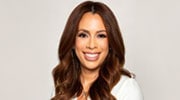Inside the #SpotItToStopIt movement
Conversation with leaders
Women have to feel more comfortable communicating even if their idea isn’t fully formed
Meerah Rajavel
Chief Information Officer, Palo Alto Networks
Adam Bryant: As a woman in business, I’m sure you’ve encountered some headwinds over your career.
Meerah Rajavel: I never really saw them as headwinds because I’ve faced many of them early on. I was the first person in my family to get a four-year engineering degree. Just to be able to go to school, I had to convince my dad first. And then we had to convince all the elders in the family to let me pursue my education outside the small town where we were living.
And right after college, I got married to a great guy who really was a role model for empowering women. It was a traditional arranged Indian marriage, and he told me the very first time we spoke, “I need you to be independent. I don't want you to depend on anybody for anything.” He was my partner in convincing my in-laws that I was going to be a working woman. So I had to work through a lot of headwinds just to get my first job.
For the longest time, I took it for granted that the table is not set equally for women and that we always had to convince and influence others to get what we wanted. But later on, as I moved into leadership positions. I started to feel that it wasn’t fair that one gender had to work harder than the other.
But imposter syndrome also creates its own challenges. People can start thinking they are not good enough. I’ve learned that it’s okay not to have all the answers figured out. You just need to set the proper context so that you can take more risks to share your ideas. As women, many times we want to have all I’s dotted and T’s crossed, and we want to make sure all aspects of the business—including people and process—are taken care of. That’s a strength, but it can also be an inhibitor. Women have to feel more comfortable communicating even if their idea isn’t fully formed. Otherwise, people can think you don’t have anything to contribute.
Adam: What other advice do you share with women?
Meerah: I tell them not to be apologetic. In many instances, it can come across as putting yourself down. It’s not about being arrogant. Humility is a very important quality for leaders. You can't be a leader if you're not grounded. But don't just use “I'm sorry” as connecting words as you’re talking. That just lowers your credibility and makes your voice not heard.
Part of the challenge for me with this early on was my background. I grew up in a culture where you don't toot your horn, because that’s not considered polite. You have to be humble. But I found often in my career that I was producing results, and then someone else was always being rewarded for them. I changed once I became a leader of a technical team, because it was no longer about me. I needed to make sure I was promoting the work my team was doing and that they were getting the right credit. As a leader, I owed that to them.
Adam: When you do face headwinds, what is your framework for deciding whether to engage in the moment or let it go?
Meerah: My brain is a very objective brain. Anytime things get very hot, the first thing I do is to diffuse the emotional bubble. I take the emotions out of it. The moment you diffuse the emotions, you can start seeing things much more clearly. Many times, you can do it yourself. Other times, you may need to reach out to your coach or mentors and ask for a few minutes of their time. Often, once you take the emotion out, the true problem is much easier to solve.
Adam: Do you feel like progress is being made for women in the workplace?
Meerah: Progress is coming. The recognition is there. People are taking actions. Every company now looks at their diversity and inclusion in a much more data-driven fashion than ever before. But I don’t think it’s coming fast enough. And that’s not something you can put on only businesses. It’s also true more broadly in society. How do you encourage more gender diversity in different fields early on? I talk to school kids and college kids quite a bit. Ten years ago, I might have heard them say that math was difficult. But the last time I spoke to a bunch of eighth and ninth graders, they were talking about cybersecurity as a cool thing.
Adam: What advice do you share with younger women about how to navigate the headwinds that we’ve been discussing?
Meerah: Know who you are and be authentic. When you’re not authentic, work doesn't feel fun. Know the kind of culture that you’re going to be comfortable with. Also, don’t lose sight of the importance of producing excellent business outcomes. Because at the end of the day, results speak for themselves. So, make sure your priorities are clear. For me, the order is customers, the organization, my team, and then me. Then use that sequence to make every decision and to guide how you communicate your decisions.














